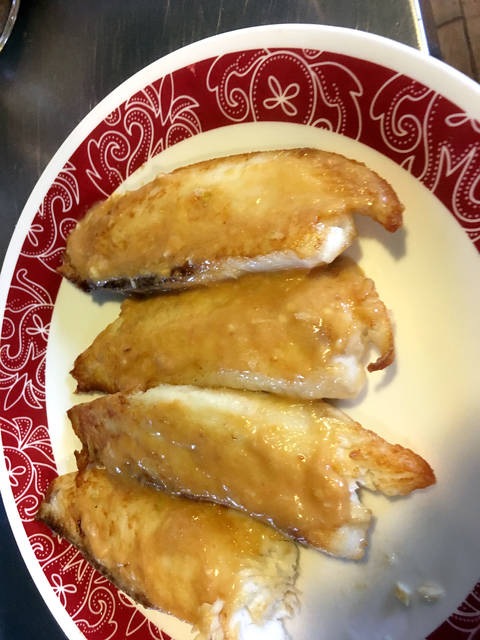After seeing University of Hawaii grown tilapia in the seafood section of KTA, I wanted to look into this fish. Tilapia had always been one of those fish that is easy to raise but I never thought of eating it.
I think, like most others, we had a perception that it might have a muddy taste.
However, tilapia is the fourth most consumed fish after shrimp, tuna and salmon!
I love trout and catfish so I needed to try this freshwater fish for myself.
In the January/February issue of Cook’s Illustrated, their article titled, “Why You Should Try Tilapia,” further peaked my interest. The three reasons the article stated why we should love tilapia are because of improved farming techniques, there is no muddy taste, it tastes great, and has a meaty flesh with a mild flavor. The second reason in that it is nutritious, low in fat and high in protein and importantly, it is sustainable. And according to the Monterey Bay Aquarium Seafood Watch list, is the best choice for sustainability.
The Washington Post brought in D.C. chef Scott Drewno and food critic Tom Sietsema to taste test several white fish and the tilapia came in second. But Chef Drewno, “formerly a tilapia detractor, declared it his favorite.”
There has been concern in the past that tilapia has more omega 6 fatty acids than omega-3 fatty acids but now the American Heart Association is stating that “people who eat 5 and 10 percent of their calories in the form of omega 6 fatty acids, reduce their risk of heart disease relative to people who eat less of these polyunsaturated fats.”
We have all heard about the benefits of omega 3 fatty acids and its benefits for the heart, but we have not heard much about omega 6 fatty acids. It is linoleic acid and is in certain foods like vegetable oils and nuts.
An essential fat, we need it for bone health, brain function, reproductive health, hair growth and regulation of metabolism.
We need only 5 to 10 percent of omega-6 fatty acids for its health benefits. The correct proportion of omega 3 to omega 6 is 2:1, but unfortunately, many American eat too much omega 6 fatty acids (fried foods) with ratios of 12:1 to 25:1 and without so much omega-6 fatty acids, there may be some inflammatory problems.
With the right amounts of omega-6 fatty acids, the University of Maryland Medical Center reports that omega-6 fatty acids can control some diseases such as ADHD symptoms in children and bone density loss from osteoporosis.
Either fresh or frozen tilapia will work, but be sure to thaw frozen before cooking. When pan frying, allow the fillets to sit at room temperature for room temperature. Pat the fish with paper towels well.
Here is Cook’s Illustrated take on sauteed tilapia:
Sauteed Tilapia
Serves 4
Cooking time: 35 minutes
4 (5 to 6 ounce) skinless tilapia fillets
1 teaspoon kosher salt
2 tablespoons vegetable oil
Lemon wedges
Place tilapia on cutting board and sprinkle both sides with salt. Let sit at room temperature for 15 minutes. Pat tilapia dry with paper towels Using seam that runs down middle of fillets as guide, cut each fillet in half lengthwise to create one thick half and one thin half.
Heat oil in 12 inch nonstick skillet over high heat until just smoking. Add thick halves of fillets to skillet.
Cook, tilting and gently shaking skillet occasionally to distribute oil, until undersides are golden brown, 2 to 3 minutes. Using thin spatula, flip fillets. Cook until undersides are golden brown, about one minute.
Transfer to platter. Serve with Chive-Lemon Miso Butter.
Chive-Lemon
Miso Butter
2 tablespoons red or white miso paste
1 teaspoon grated lemon zest
2 teaspoons lemon juice
1/8 teaspoon pepper
4 tablespoons unsalted butter, softened
2 tablespoons minced fresh chives
Combine miso, lemon zest and juice, and pepper in small bowl. Add butter and stir until fully incorporated. Sit in chives and set aside.
Foodie Bites
• The Hawaii Community College’s Culinary Arts program in open for business. The Cafeteria is open from 10:30 a.m.-12:30 p.m. Call 934-2559 for specials of the day and if poke bowls are available. This week at the Bamboo Hale, the European Standard Menu and the cuisine of Spain will featured. Call 934-2559 to make reservations.
• The Rotary Club of South Hilo’s Hilo Huli at Mokuola Island (Coconut Island) will be held on Sunday, May 5.
• Interested in entering the Ka‘u Coffee Festival recipe contest? It will be held on Sunday, April 28, with pupu, entree and dessert divisions. Entree deadline is April 20. Contact 808-928-0550 for more information or obtain an entry form at kaucoffeefestival.com/assets/Recipe-Contest-Entry-Form-2019.pdf.
• Due to the unusual weather conditions in Europe, both in Italy and Greece, there will be a shortage of olive oil this year. Italy predicts a 57 percent drop and Greece, hit first with extreme drought, then heavy rains and added to that, olive fly infestations, will have a bad olive oil year this year. It’s basic economics — expect prices to rise.
• I visited the University of Hawaii Aquaculture facilities and was taken around by technician Adrian Barnes. Watch for next week’s column about our tour.
Email Audrey Wilson at audreywilson808@gmail.com.






